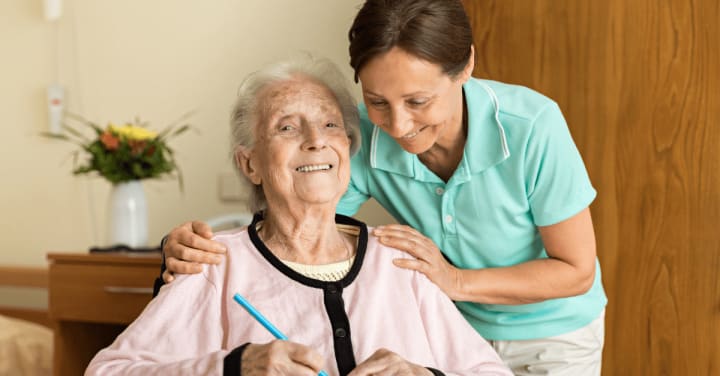Seven Hidden Family Caregiving Challenges: What Nobody Tells You
Family caregiving touches one in five Americans today, creating one of life's most meaningful yet challenging roles many of us will experience. The journey brings precious moments of connection alongside unexpected hardships that rarely surface in everyday conversations about caregiving.
Look beyond the visible caregiving tasks and discover a demanding reality. Caregivers dedicate an average of 253 hours monthly to providing care, equivalent to two full-time jobs. Those searching for Alzheimer's care in Nichols Hills face particularly heavy burdens, with studies showing that 40% of family caregivers struggle with high stress levels while 38% battle depression or anxiety.
The Emotional Toll Nobody Warns You About
Hidden beneath the visible tasks of family caregiving lies a complex emotional landscape few people discuss openly.
The emotional toll of caregiving often blindsides even the most prepared individuals, creating inner struggles just as demanding as physical care responsibilities.
Anticipatory grief while caregiving
Anticipatory grief differs profoundly from post-death mourning. This grief emerges before the actual loss occurs, bringing unique challenges as caregivers watch their loved one's gradual decline while contemplating life without them.
Families managing Alzheimer's care in Nichols Hills often experience anticipatory grief through:
-
Sadness over your loved one's suffering and illness
-
Disbelief when facing the reality of their condition
-
Anxiety about the future without them
-
Spiritual questioning about the meaning of life and loss
Coping with guilt when you need a break
Guilt is caregivers' most common emotional challenge, especially when taking necessary breaks. Yet despite understanding this truth, many struggle with overwhelming guilt when stepping away, even briefly.
Identity Loss and Role Confusion
Family caregiving creates one of life's most profound role transformations. As care responsibilities grow, many find themselves in unfamiliar territory where their sense of self becomes deeply intertwined with caregiving duties. Research places this identity crisis among caregivers' top challenges, yet it receives far less attention than practical care tasks.
When a parent becomes a child
This transition creates what experts describe as a "changed asymmetry" in the relationship. Such fundamental relationship changes trigger emotional distress for both caregivers and care recipients.
Despite common terminology, experts warn against viewing this shift as simple "role reversal" where "parents become children." This oversimplification fails to honor the dignity and personhood of older adults needing care. A thoughtful caregiver advocate explains:
A more accurate perspective sees this shift as a transformation of existing roles rather than a complete reversal. The parent-child relationship continues but evolves to accommodate new circumstances. For many caregivers, this nuanced view helps maintain dignity while acknowledging fundamental changes.
Physical Demands and Health Consequences
Caregiving taxes the body as deeply as it challenges the mind and heart. Physical demands place a measurable toll on caregiver health, often turning everyday people into round-the-clock healthcare providers whose bodies operate beyond sustainable limits.
Sleep deprivation effects on caregiver health
Despite being a fundamental biological need, sleep becomes a rare luxury for family caregivers. The research paints a troubling picture: up to 76% of caregivers report poor sleep quality, with women experiencing significantly more sleep problems than men. These aren't minor disruptions—objective measurements reveal concerning patterns, including shortened sleep duration and frequent nighttime awakenings.
Health consequences follow these disturbed sleep patterns. Chronic sleep deprivation significantly alters immune function, with research showing caregivers have 23% higher stress hormone levels and 15% lower antibody responses than non-caregivers. Caregivers also heal from wounds more slowly.
Learning medical tasks without proper training
Today's family caregivers function essentially as nurses without nursing credentials. As hospital stays grow shorter and complex treatments move home, caregivers increasingly perform tasks once handled only by licensed professionals.
These responsibilities usually require extensive training, yet 47% of caregivers report never receiving instruction from any source. More than 60% learned medication management independently through trial and error. Among those caring for "high-need" older adults—people with dementia or requiring help with at least two self-care activities—65% help with medication management, 20% perform medical tasks and 35% provide wound care.
You're Not Alone: Finding Support and Prioritizing Your Well-being as a Caregiver
Family caregiving challenges extend far beyond the daily tasks of bathing and feeding. Your caregiving journey might overwhelm you at times, but please remember that experiencing difficult emotions, role shifts, and physical exhaustion doesn't make you less effective as a caregiver. It simply confirms your humanity.
Asking for help strengthens rather than diminishes your caregiving capacity. Professional support services provide valuable resources to complement your efforts. To schedule a community tour at Iris Memory Care of Nichols Hills, discover available care options by calling (405) 286-9500.
Your well-being matters equally to your loved one's care—perhaps even more so. Making time for yourself, nurturing relationships outside caregiving and protecting your health enable better care while preserving your quality of life. The caregiving path brings unexpected difficulties, but you never need to walk it alone.
FAQs
Q1. What are some hidden challenges family caregivers often face?
Family caregivers often face emotional tolls like anticipatory grief and conflicting emotions, identity loss, invisible labor of care coordination, family conflicts, physical demands leading to health issues and difficulties finding adequate support when traditional resources are unavailable.
Q2. What strategies can help caregivers maintain their identity?
To maintain personal identity, caregivers should set boundaries, preserve key relationships outside caregiving, continue meaningful activities, connect with support groups and consider respite care. It's crucial to make time for self-care and activities unrelated to caregiving.
Q3. What should caregivers do when traditional care resources aren't available?
When traditional care resources like memory care communities aren't available, caregivers can explore alternatives such as adult foster care homes or board and care homes. They should also focus on creating their support network, utilizing online forums, joining caregiver support groups and connecting with local community services through resources like the Eldercare Locator.


